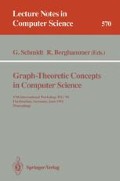Abstract
Given a connected, undirected distance graph with required classes of nodes and optional Steiner nodes, find a shortest tree containing at least one node of each required class. This problem called Class Steiner Tree is NP-hard and therefore we are dependent on approximation.
In this paper, we investigate various restrictions of the problem comparing their complexities with respect to approximability. A main result is that for an input of trees without Steiner nodes and unit edges only, Class Steiner Tree is as hard to approximate as Minimum Set Cover, for which no constant approximation is known, too. Further we prove that if this restricted version has an approximation scheme, all members of the optimization problem class MAX SNP do.
Preview
Unable to display preview. Download preview PDF.
References
Marshall Bern and Paul Plassmann. The Steiner problem with edge lengths 1 and 2. Information Processing Letters, 32:171–176, 1989.
H.N. Gabow. Scaling algorithms for network problems. J. Comp. Sys. Sc., 31:148–168, 1985.
Michael R. Garey and David S. Johnson. Computers and Intractability: A Guide to the Theory of NP-Completeness. W. H. Freeman and Company, 1979.
Edmund Ihler. Approximation and existential second-order logic. Technical report, Institut für Informatik, Universität Freiburg, 1990.
Edmund Ihler. Bounds on the quality of approximate solutions to the Group Steiner Problem. In Graph-Theoretic Concepts in Computer Science,WG90, volume 484 of Lecture Notes in Computer Science, pages 109–118. Springer, 1991.
Edmund Ihler, Gabriele Reich, and Peter Widmayer. On shortest networks for classes of points in the plane. Technical report, Institut für Informatik, Universität Freiburg, 1991.
Richard W. Karp. Reducibility among combinatorial problems. In R. E. Miller and J. W. Thatcher, editors, Complexity of Computer Computations, pages 85–103. Plenum Press, 1974.
L. Kou, G. Markowsky, and L. Berman. A fast algorithm for Steiner trees. Acta Informatica, 15:141–145, 1981.
Kurt Mehlhorn. A faster approximation algorithm for the Steiner problem in graphs. Information Processing Letters, 27:125–128, 1988.
Alessandro Panconesi and Desh Ranjan. Quantifiers and approximation. In Proc. 22th Annual ACM Symp. on Theory of Computing, pages 446–456, 1990.
Christos H. Papadimitriou and Mihalis Yannakakis. Optimization, approximation, and complexity classes. In Proc. 20th Annual ACM Symp. on Theory of Computing, pages 229–234, 1988.
Gabriele Reich and Peter Widmayer. Beyond Steiner's problem: A VLSI oriented generalization. In Graph-Theoretic Concepts in Computer Science,WG89, volume 411 of Lecture Notes in Computer Science. Springer, 1990.
Author information
Authors and Affiliations
Editor information
Rights and permissions
Copyright information
© 1992 Springer-Verlag Berlin Heidelberg
About this paper
Cite this paper
Ihler, E. (1992). The complexity of approximating the class Steiner tree problem. In: Schmidt, G., Berghammer, R. (eds) Graph-Theoretic Concepts in Computer Science. WG 1991. Lecture Notes in Computer Science, vol 570. Springer, Berlin, Heidelberg. https://doi.org/10.1007/3-540-55121-2_8
Download citation
DOI: https://doi.org/10.1007/3-540-55121-2_8
Published:
Publisher Name: Springer, Berlin, Heidelberg
Print ISBN: 978-3-540-55121-8
Online ISBN: 978-3-540-46735-9
eBook Packages: Springer Book Archive

